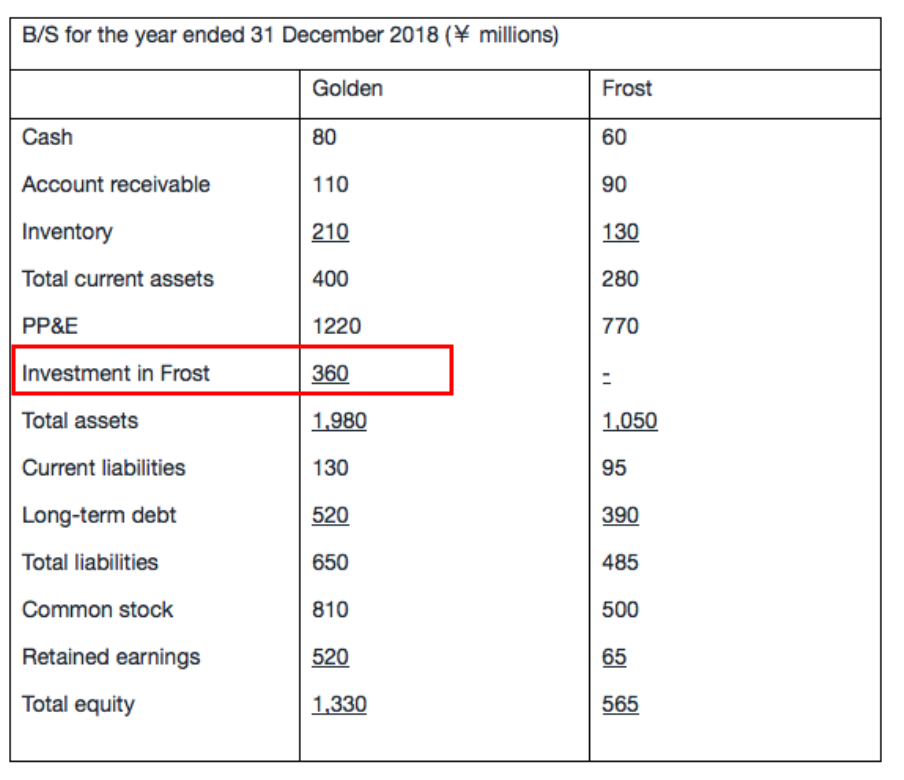NO.PZ2018111303000026
问题如下:
Fabian, CFA, work on the Equity investment company. Golden Elementary school paid ¥360 million to purchase 50 percent Frost Early Education Center on 31 December 2018. The excess of the purchase price over the fair value of Frost’s net assets was attributable to previously unrecorded licenses. These licenses were estimated to have an economic life of five years. The fair value of Frost’s assets and liabilities other than licenses was equal to their recorded book value.
Golden and Frost’s condensed income statements for the year ended 31 December 2018, and Balance Sheet are presented the following table:


Golden’s long-term debt to equity ratio on 31 December 2018 most likely will be lowest if the results of the acquisition are reported using:
选项:
A.the equity method
B.consolidation with full goodwill
C.consolidation with partial goodwill
解释:
A is correct.
考点:不同的合并会计报表方法下,会计科目的对比。
解析:
(1)如果使用equity method,long-term debt to equity=520/1,330=0.39
(2)如果使用consolidation method, long-term debt to equity=(母公司的long-term debt加子公司的long-term debt)/(母公司的equity+子公司的MI)(520+390)/(1,330+360)=0.54
※【计算MI的方法】
只要不是100%收购,就会有MI,因为合并是合并100%的资产和100%负债,相当于资产负债表左边多了100%的equity那么多金额,但是公司出的钱并不是100%的收购的金额,也就是cash并没有减少那么多,这样的话资产负债表左边就多出一块,MI相当于一个调平项,让资产负债表右边也多一块,报表就平了。
MI计算公式有两个,分别对应full goodwill method和partial goodwill method,从计算公式来看:
- full goodwill method下:MI =(acquisition cost / % of interests acquired) × (% of non-controlling interest)
- partial goodwill method下:MI = FV of net identifiable assets × (% of non-controlling interest)
当有goodwill的情况,partial goodwill和full goodwill两种方法计算出来的记入合并报表中的goodwill金额是不一样的,此外,针对其余的资产和负债处理相同,都是100%合并,这样的话资产端两种方法下总的资产就不同了,MI作为equity里面的调平项,就会体现两种方法的区别,所以partial goodwill和full goodwill两种方法计算出来的MI也不同。full goodwill计算的goodwill更大,MI也更大。但如果没有goodwill,则两种方法下计算的MI相同。
本案例中没有产生goodwill(具体原因最下面详述),因此不管是full goodwill method还是partial goodwill method,两种计量方法得到的MI相同。换句话说,只有在存在goodwill的情况下,不同goodwill计量方法下的MI才有区别。
※【没有goodwill的原因】
题干中的信息: 超出net fair value的部分是由于要购买unrecorded licenses , 其他资产和负债的fair value=book value。这句话可以得到两个结论:
1. 子公司有一个未记账的资产,而在合并报表中,这项资产应该计入资产负债表。它的价值是并购对价超过子公司净资产 fair value的部分。
相当于是Golden公司花360买了Frost公司一半的identifiable assets(包括已入账的也包括未入账的)。如果要买全部的identifiable assets则要花720:其中565是为了买已入账的identifiable assets,剩下的155根据题目信息,都是为了买这个unrecorded license。
资产中加入unrecorded licenses之后,子公司资产增加155,liability不变,equity增加155,equity=155+565=720, 其中母公司只持股50%,因此有50%是归属于少数股东的部分:MI=720*50%=360
老师,不理解consolidation的答案解析,为什么(520+390)/(1,330+360)呢?分子可以理解,分母为什么用母公司net equity加上少数股东权益呢?题目中给的表格不是并表前的两个公司的情况吗,那应该是(520+390)/(1,330+720)吧?请问怎么理解呢。




